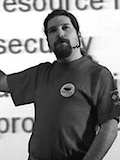GOTO Amsterdam (June 13-15, 2016) is a vendor independent international software development conference with more than 60 top speakers and 800 attendees. The conference covers topics such as Microservices, Rugged, JavaScript, Post-Agile, Data, Spring++, Connected Worlds & Philosophy.
Ted Neward, TweetTed is a Big Geek

Biography: Ted Neward
Ted Neward is an independent consultant specializing in high-scale enterprise systems, working with clients ranging in size from Fortune 500 corporations to small 10-person shops. He is an authority in Java and .NET technologies, particularly in the areas of Java/.NET integration (both in-process and via integration tools like Web services), back-end enterprise software systems, and virtual machine/execution engine plumbing.
He is the author or co-author of several books, including Effective Enterprise Java, C# In a Nutshell, SSCLI Essentials, Server-Based Java Programming, and a contributor to several technology journals. Ted is also a Microsoft MVP Architect, BEA Technical Director, INETA speaker, former DevelopMentor instructor, frequent worldwide conference speaker, and a member of various Java JSRs. He lives in the Pacific Northwest with his wife, two sons, and eight PCs.
Twitter: @tedneward
Presentation: TweetBusy Developer's Guide to MeteorJS
Ever wished you could just focus on one language, and use that one language across all the various tiers and layers of your application, without creating a monstrous bloated mess?
If you're willing to have that "one language" be Javascript, there might be an option for you to do just that.
MeteorJS is a new breed of Javascript package, one that stretches across client, server and database, to deliver a development experience that is entirely Javascript in nature. In essence, it is a "full-stack Javascript" development experience, and it represents an entirely different way of building Web-based applications that focuses almost entirely on application, and not on "infrastructure", "architecture", "packaging" or any of the other things that can distract from building the app.
In this session, we're going to explore the basics of the MeteorJS system, including how to get started, how MeteorJS is constructed, how it works, and how to build applications in it. Some knowledge of JavaScript is expected, but deep JS Fu isn't necessary.
Prerequisite attendee experience level: beginner
Presentation: TweetPsychology, Philosophy and Programming
Philosophy: ancient Greek for "love of wisdom", philosophy is the study of the general and fundamental nature of reality, existence, knowledge, values, reason, mind and language.
Psychology: the study of mind and behavior.
Programming: ancient Latin for "please God let it compile this time".
Three distinctly different subjects, yet each deals with fundamentally the same thing: the mind, how we (or others with whom we interact) think, act, behave, and engage. Most of the time, programmers (and philosophers and psychologists) don't really think of these three things as being similar or alike, but given that all three work closely with the mind, mental models, and the ways in which we perceive and process information, it probably shouldn't come as a surprise that there's a surprising amount of overlap.
But it does come as a surprise to most developers. And in this presentation, we're going to uncover some of those surprises, learn a little about psychology, play amateur philosopher, contemplate the nature of mind and logic and the universe...
...and become better developers as a result.
Prerequisite attendee experience level: beginner
